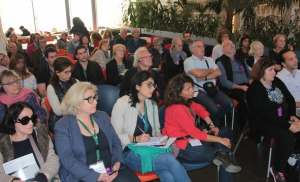In Jerusalem, the KKL France Israel Today and Tomorrow Mission learned about Jerusalem’s past and how it looks forward into the future. KKL France’s Israel Today and Tomorrow delegation, which spent five days touring the country from November 1st until November 5th, learned about the history of the Land of Israel, experienced Israeli society as it is today – and also looked towards the future with Israeli hi-tech.
At the Mobileye headquarters in Jerusalem, the delegates met the company’s Director of Business Development Udi Remer, who told them about the development of automatic vehicles and an advanced system designed to prevent road accidents. “The question is not who will be the first to produce an automatic car, but who will manage to create a safe vehicle that will sell for a reasonable price,” explained Remer.
Mobileye’s innovative system warns the driver in real time of risk factors such as impending collision, too-close proximity to another vehicle, lane changes, and the approach of pedestrians or cyclists, as well as automatically switching on headlights when necessary and keeping within the speed limit.
The fact that Mobileye was sold this year to Intel for over fifteen billion dollars is testimony to the enormous potential of this technology.
When asked about fears that terrorists could gain control of automatic vehicles, Remer acknowledged that this is indeed a relevant issue and said that a great deal of effort had been invested in cyber protection to guard against such an eventuality.
“We always hear about Jerusalem as a city of history, religion and spirituality, but I was not surprised to be told that it produces hi-tech too,” said Professor Alain Bloch of Paris’s HEC School of Business. “I believe that the ideas that are born here can change the lives of many people throughout the world.”
While touring the Mobileye workshop, the delegates were impressed by the innovative vehicles. A spin in an automatic car is not yet on offer, but it is reasonable to assume that in just a few years’ time it will become a matter of routine.
Rafi Fischer, Director of Media Communications at OrCam, showed the visitors unique technology that helps blind and partially-sighted people to function independently in a more accessible world: a tiny video camera mounted on a pair of spectacles reads out texts that the user encounters in everyday life. The delegates were impressed by a demonstration of how a blind person could read a newspaper, tell the time and even recognize a friend, all with the help of this miniature camera.
The next meeting introduced the delegates to the BioJerusalem Center, which offers guidance to entrepreneurs and investors in bio-medical sciences, holds workshops and international conferences and facilitates collaboration both in Israel and abroad between industrialists, hospitals and the academic world. “We regard bio-med as an economic growth engine,” said BioJerusalem Executive Director Dr. Shai Melcer.



















